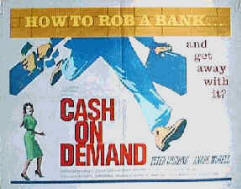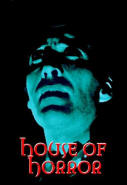
Rather
than bore you with the usual diatribe on the ins and outs of
the production, that is so often accessible via other Hammer
related websites including my own (when I make the time for
it that it), I prefer on this occasion to give my personal
feelings.
The film
itself is something of a minuet. At only 66 minutes in
length, a minor play which, despite its brevity, is a true
classic film. In no way a horror, but very much a tense
atmospheric thriller, which tantalises and excites throughout.
Actually.
the film is so tense, that it would work splendidly as a
theatrical production, set within a relatively limited set.
The play
concerns a rather tight-fisted and vindictive bank-manager
called Fordyke (played by the ever-great Peter Cushing), and
his dealings with the criminal Colonel Hepburn (Andre Morell).
Fordyke
greets and welcomes the 'Colonel' into his office, only to
discover that he is not whom he says he is, and after a
thorough investigation of arrangements, he forces Fordyke
into handing over the entire stock of the bank vault.
Unsuspected by the fellow clerks. it seems that all is lost
and that Fordyke is to loose all face, and his job, with his
wife and child being held ransom at home...
Well, such
is the basic plot. I'll not spoil the rest of the story
because it is so intriguing, and engrossing. Its one of
those really rare titles too. Very few people seem to have it
in their collections, and it is not currently available
either in the retail market or via the bootleggers.
The concept
of the tight bank clerk, and the Christmas setting, with the
snow falling all around them outside, one cannot help but
draw comparisons with A Christmas Carol. Indeed, the
idea that Fordyke is paying for his cruelty to his staff with
this rather subversive hold-up are also themes which we see
recurring in the tale of Ebenezer Scrooge.
But unlike
perhaps a normal Hammer treatment of the Christmas Carol,
there are no ghosts, and the only spirits are those which
Fordyke keeps in the office drinks cabinet.
Peter gets
the rare chance to play outside of his nice-guy hero image,
that somehow he maintains even throughout the Frankenstein
series of films. He is cold and calculated, and quite
honestly we are privileged to see the hardened exterior crack
under the pressure of the robbery.
A well-seasoned
actor by now, the divergence from his normal roles no doubt
gave him great pleasure. His portrayal is beautifully
supported by Andre Morell as the Colonel. Andre is clear and
precise, and jovially harsh, complementing and enhancing the
relative frailty of Fordyke.
It would be
the second Hammer feature the two stars had done together,
having previously starred in 1959's Hound of the Baskervilles,
with Cushing as Holmes and Morell as trusty sidekick Watson.
The pair work well together, and it is rather fun to watch
them in this slightly different arrangement. They would
return together for She, though Andre would find all his
lines dubbed by actor George Pastell.
The pace can
be a bit slow, but for an hour long film, they manage to cram
in an awful lot, providing one of the tensest films I have
seen (with the exception of Alfred Hitchcock's Rear
Window).
Every step
of the way we wait something to go wrong, for the other
clerks to work out that something is amiss, for an all-important
phone call to come through and ruin the whole game. But like
Fordyke, we are aware that the building is being watched, and
the Colonel must signal to them regularly; and that his
family is in danger of death should anything go wrong. Our
loyalties become twisted and corrupt.
The film is
so understated in terms of Hammer fandom. We instead resolve
to find as many Dracula pictures as we can lay our
hands on as the be-all and end-all of the company. It is a
shame, because often the most enthralling and actually,
interesting work came from those pictures outside the horror
genre.
On The
Buses was one of Hammer's biggest successes, and yet it
was a comedy. Cash On Demand, although greatly
overlooked at the time of release, was one of a list of
thrillers which promises so much and delivers. A black and
white masterpiece of sorts which begs further indulgement.
In short, a
splendid offshoot from the greatest film company in the world
(allegedly). The cast is on top form, the setting minimal.
Nicely shot, and beautifully presented. And most of all, sadly
overlooked.
text is (c)
copyright RJE Simpson 2000
first published on Lee Sergeant's Hammer website in 2000.
Introductory text is (c) RJE Simpson 2002
Not to be reused without permission of the author. Email to
info@avalard.com
This page posted 30th July 2002.
reformatted and reposted 24 August 2006


